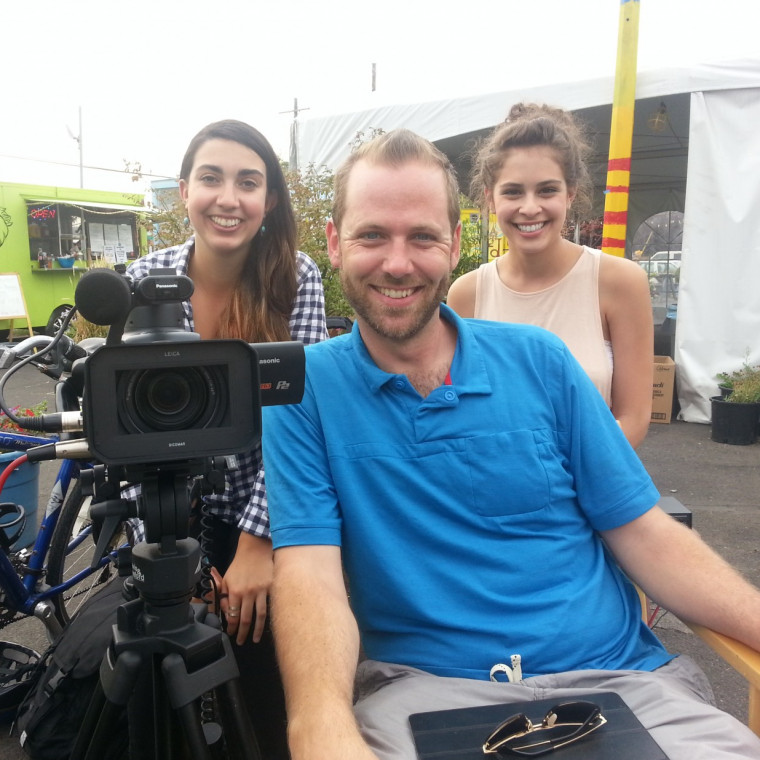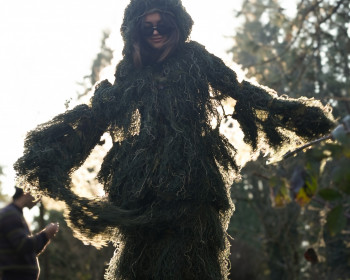Students explore mobile food culture in Cartlandia
Open gallery

During the summer, Lewis & Clark students continue to work hard in their fields of study. By collaborating with faculty on research projects, students are able to engage their curiosity, expand their learning, and prepare for life after college, all while making meaningful contributions to scholarship.
Alia Al-Hatlani ’14 and Sofia Alicastro ’14 are working alongside Assistant Professor of Rhetoric and Media Studies Bryan Sebok on his documentary, Cartlandia. The feature-length documentary explores the phenomenon of food carts in Portland and the cultural implications therein. In the following Q&A, the team reflects on their experience.
What are you researching? What question or problem are you trying to answer/solve with your research?
We are exploring the mobile food revolution through the lens of the Portland food carts. In talking with cart owners, pod developers, authors, sociologists, cart architects, urban planners, bloggers, and food cart enthusiasts, we are beginning to understand how the food carts have been and continue to impact culinary culture and life in Portland. The feature-length documentary aims to explain the mobile food movement, assess the cultural and economic impact of the movement, as well as comment on how this revolution has proven to be uniquely “Portland.”
Does your research have any potential applications in the real world, or will it influence other work in your field?
We’re both rhetoric and media studies students, so the opportunity is quite relevant to our major as well as our individual areas of interest. The film will hopefully appeal to a wide, international audience. It will also provide a model to cities across the country who are interested in growing a mobile food industry. We are interested in film as a future career, so this is a valuable opportunity to work in the field.
Is any of your research taking place off campus? If so, what’s that experience like?
Editing, production meetings, and merchandise manufacturing take place on campus; however, the interviews and majority of the footage takes place off campus. We shoot all over Portland.
What first sparked your interest in this research area?
Alicastro: I am pursuing a career in film and the topic of the food carts was extremely appealing. It’s an opportunity to engage with the local community while addressing a sociocultural phenomenon in a measured, thorough manner. I have taken classes with and worked with Bryan before, so the prospect of crewing on a film that Bryan was writing and directing was appealing to me. I am seeing how the dynamic work Professor Sebok does in the classroom translates into field research and creative expression. Participating in this film has been an invaluable experience.
Al-Hatlani: I’ve taken two courses with Bryan—Mass Media Messages and Documentary Form. I found Documentary Form to be an eye-opening class because you don’t realize how much more difficult it is to create a story line for a documentary when there is not story to guide the editing process, as a movie does. The food carts are such a staple of Portland, documentary is a great way to explore and communicate that staple.
How has working closely with faculty influenced your education?
Bryan has been our teacher in the past and on this film he has continued to teach us about the technical aspects involved in making a feature-length documentary. Seeing how he manages the project, from visual design to interview preparation, has been enlightening. Our educational experience has been deeply enriched by this experience. Our film education has continued throughout the summer as we learn about project coordination, filming techniques, interviewing, and storytelling more broadly.
How do you hope your experiences this summer will impact your future studies or professional pursuits?
Alicastro: I am an aspiring filmmaker and am learning quite a bit from this film. I will add this experience to my portfolio and consider it a serious stepping stone to graduate school or a career in the entertainment industry.
Al-Hatlani: I hope that this opportunity will lend itself to other internships of a similar style. I’m very interested in set design as a career, and familiarizing myself with the equipment and process of creating a movie helps build that experience.
Anything else you’d care to add?
A special thank you to the dean’s office for funding this remarkable project. Portland has proven to be an incredible city with heartwarming communities. Thank you also to Bryan for including us in his film.
About the program
Lewis & Clarks’s Mellon Foundation grant provides funds to help faculty infuse collaborative research into a broad range of new and existing courses and supports an increased number of student-faculty summer research projects.
“We firmly believe that engaging students in the practice of their discipline is the best way to prepare them for life beyond the college,” said Tuajuanda Jordan, dean of the College of Arts and Sciences. “Student-faculty research is seen as one of the strengths of our educational experience, and with this grant we can ensure that students have access to this type of opportunity.”
With this support, The Andrew W. Mellon Foundation continues its long legacy of supporting and enriching the arts and humanities at Lewis & Clark.
Department of Rhetoric and Media Studies
Zibby Pillote ’14 contributed to this story.
More Newsroom Stories
Public Relations is located in McAfee on the Undergraduate Campus.
MSC: 19
email public@lclark.edu
voice 503-768-7970
Public Relations
Lewis & Clark
615 S. Palatine Hill Road MSC 19
Portland OR 97219

